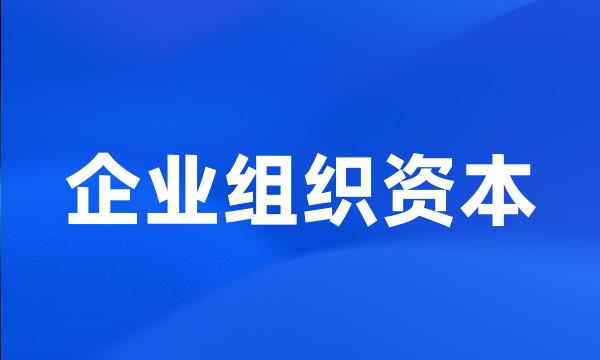企业组织资本
- 网络enterprises organizational capital
 企业组织资本
企业组织资本-
目前,对组织资本的研究多数集中在组织资本的解释、评估及其与人力资源开发的关系上,对于企业组织资本信息披露的相关研究非常少。
There is little research on the organizational capital information disclosure .
-
企业组织资本增长机制研究
Research on the Mechanism of the Enterprise Organizational Capital Growth
-
核心能力是企业组织资本和社会资本的集合。
Core competence is the combination of organization capital and social capital .
-
因此,企业组织资本的信息披露对于企业的各利益相关者来说是非常重要的。
Therefore , organizational capital information disclosure is very significant to all the stakeholders of the enterprises .
-
论知识经济时代企业组织资本的增长机制
A Study on the Increase Mechanisms of Organization Capital of Enterprises in the Intellectual and Economically Demanding Era
-
知识共享机制是个体人力资本向企业组织资本转化过程中的核心机制。
Knowledge sharing mechanism is one of the core mechanisms to transform individual human capital into corporate organizational capital .
-
结果表明企业组织资本各维度通过不同的路径影响内外部隐性知识转移,进而作用于渐进式技术创新和根本性技术创新。
The result shows that the different dimensions of organizational capital influenced internal and external tacit knowledge transferring by different paths , then affected the incremental innovation and radical innovation .
-
研究结论在一定程度上补充和丰富了企业组织资本以及技术创新的相关理论,并且对企业技术创新实践提供理论支持。
This research conclusion supplements and enriches the related theories about organizational capital and technology innovation to some extent , and also provides theoretical support to the technology innovation practice .
-
另外,通过对企业组织资本与企业社会资本的分析,使我们对企业能力的核心&企业知识所处的内部和外部环境有了更全面的概括。
In addition , through the analysis of enterprise organization capital and enterprise social capital , we can summarize more comprehensively the core of the enterprise capability - enterprise internal and external environment of the knowledge .
-
基本结论如下:第一,我国制造业企业组织资本在结构上包括五个维度:组织认同、流程共享、规范约束、技能培训和职业发展。
The main conclusions are as the following : First , the organizational capital of Chinese manufacturing enterprise consists of five factors , including organizational identification , process sharing , norm constraining , on-the-job training , and career development .
-
本文通过对企业组织资本的产权分析,基于其不可分性与外部性的基本属性与特征,认为它是企业的一种特殊的共有产权;
Through analyzing the property rights of enterprises ' organization capital , and based on its basic attributes and characteristics of " indivisibility " and " external " , this paper thinks that organization capital is a special total property rights ;
-
企业组织资本是企业持续竞争优势的源泉,它是在个体人力资本与团队资本的基础上形成,不是它们的简单相加。
Individual human capital should be turned into organizational capital which cannot be copied by rivals . As a source of enterprises ′ competitive advantages , organizational capital is formed on the basis of individual human capital and team human capital , not simply an addition of the two factors .
-
本文将重点研究知识共享机制在企业组织资本增长过程中的作用原理,并在此基础上探讨构建知识共享机制的促进性因素。
This paper will start with the conception of individual human capital and corporate organizational capital , then focus on the action principle of knowledge sharing mechanism in the process of the increase of corporate organizational capital , and does some research on promotional factors for building knowledge sharing mechanism .
-
得到的结论是企业组织形式对资本结构产生显著性影响;
To draw the conclusion is the form of enterprise organization has a significant impact on structure of the capital ;
-
个体的职业精神和企业家精神则需要通过创业事迹、模范榜样等载体作为企业文化类组织资本。
Individual job spirit and entrepreneurship are always converted into organizational capital through start-up story and excellent individual exemplary model .
-
第一种是全面恐慌,这种情况下,需求暴跌,银行和企业破产,组织资本被摧毁。
The first is in a full-fledged panic where demand collapses , banks and companies fail and organisational capital is destroyed .
-
企业家传奇通过影响企业的组织制度资本和行业制度资本的形成来达到创造竞争优势的目的。
The entrepreneurial stories help achieve the goal of wealth creation through their influence on enterprises ′ organizational institution capital and the industrial institution capital .
-
第四部分,通过对三类人力资本价值的定量分析,初步分析风险投资公司(高度人力资本化的企业组织)人力资本定价的可能机理;
Fourthly , through three ways of mathematical analyze for human capital , this paper discusses the possible mechanism in human capital pricing ( highly human capitalized organizations ) .
-
企业组织中特定人力资本的道德研究
Research on Moral of the Special Human Capital in Enterprise
-
论财务视角下的企业人力资本、组织资本
On Enterprise ' Human Capital and Organizational Capital from the Perspective of Finance
-
依据企业理论中的组织资本和组织经验理论,企业并购的动因是获得行业专属的资源。
According to the theory of the organization capital and the organization experience , the causation is to gain the exclusive resource of the industry .
-
企业组织不重视人力资本投资型消费,对员工及其家庭产生重大影响。
The enterprise organization does not regard the consumption of the type of the human capital investment , it brings important effect to the employee and their family .
-
从企业内部看,企业组织形式、资本结构、利润分配方式会对企业的边际税率造成影响,从企业外部看,重组活动会对企业的边际税率造成影响。
From the internal perspective , organizational form , capital structure , profit distribution will affect the corporate marginal tax rate . Form external perspective , corporate restructuring activities will affect the marginal tax rate of enterprises .
-
组织资本能促进企业财务绩效,能够提升企业运作绩效,组织资本的提高也能够增强企业的人员效能。
Organization capital can enhance the financial performance , operational performance and effectiveness performance .
-
企业是具有生命的有机体,因此蕴涵在其中的企业组织资本是企业并购所必须考虑的内容。
Enterprise is a lively organism , so M & A must considerate organizational capital that is contained in enterprise .
-
企业人力资本的形成包括企业个体人力资本的形成和企业组织人力资本的形成。
The form of EHC contains the form of individual human capital and the form of organizational human capital .
-
企业社会资本基于不同的社会网络类型可以分为企业家个人社会资本与企业组织社会资本,两者既相互依存又存在矛盾。
The social capital structure of enterprise can be divided into individual social capital of entrepreneur and organizational social capital of enterprise according to the types of social network of enterprise , which two lean but sometimes restrain each other .
-
要使企业的竞争优势不随员工的流失而减弱,只有将员工的个体人力资本转化为不随个体流动而流失的企业组织资本。
Only when individual human capital is turned into organizational capital of enterprises , can the competitive advantage of enterprises remain unaffected by labor turnover .
